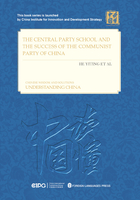
Foreword
This book, one of 22 in the Understanding China series, talks about the education and training of Communist Party of China (CPC) officials, and the Party School of the CPC Central Committee (the Central Party School).
To understand China, it is essential to be cognizant of the ruling party of China today – the Communist Party of China. The fascinating stories permeating the CPC's almost century-long history may be interpreted from different perspectives. One approach is to explore the institutions responsible for educating and training Party officials. They consist mainly of the Party schools, notably the Central Party School.
Shortly after the 19th CPC National Congress, the CPC in Dialogue with World Political Parties High-Level Meeting was held in Beijing. Attended by the leaders of nearly 300 political parties and organizations from around the world, those present also participated in two important events on the sidelines of the official dialogues and meetings: a visit to the Central Party School, and an exhibition of China's outstanding achievements over the last five years (2012-2017). The two activities complemented one another, as the CPC's achievements relate closely to the role of the Central Party School.
Looking back at history, within the 100 years since the establishment of the CPC, China has accomplished the incredible transformations from a semi-colonial, semi-feudal society to a new democratic society, a socialist society, and a socialist society with Chinese characteristics. China has thus stood up, prospered, and become strong. The Chinese nation has achieved the fundamental turnaround from continuous decline in modern times to its position today of prosperity and strength. All these changes, in essence, are attributed to the leadership of the CPC. Without its leadership, there wouldn’t be the People's Republic of China, nor economic miracle in contemporary China. This has been proved by history.
How has the CPC achieved such victories over a hundred years of struggle? Many are keen to explore and learn from its methods. The decisive factor has been evident at critical junctures of revolutionary construction and reform when, faced with a fresh environment and new tasks, the CPC has organized effective education campaigns, each of which significantly pushed forward the cause of the Party and of the people. Its fundamental approach has been to adapt the basic tenets of Marxism to China's conditions and the underlying trend of the times, and thus singlehandedly achieved successful revolution, construction, and reform. As the saying goes, where there is a will, there is a way. As Mao Zedong, one of the founders of the CPC, pointed out: “Officials are a decisive factor once the political line is determined.” During each period of struggle, the CPC has educated and trained its officials through learning and practice, so cultivating large numbers of leading officials notable for their integrity and professionalism. The CPC has thus evolved into a Marxist learning party. CPC Party schools are institutions specializing in the systematic education of Party officials and the training of the Party leadership. It was hence understandable that, after visiting the Central Party School, many foreign political party leaders perceived it as integral to the success of the CPC.
In 1924, three years after the founding of the CPC, two local Party schools were set up. In 1933, the 12th year after the CPC's founding, the Central Party School was established in Ruijin in the Central Soviet Area. The Central Party School has since worked hand in glove with the Party's cause, providing it with generations of qualified leading officials. Since the founding of the People's Republic of China, Party schools have developed into a four-tier education network of central, provincial, municipal and county schools that play an even more effective role.
Xi Jinping, General Secretary of the CPC Central Committee, was the concurrent president of the Central Party School for five years. On the role of Party schools, he observed: “The work of Party schools is an important part of the Party's work,” and, “the establishment of central and local Party schools for the education and training of officials is a major political advantage of our Party.” This is an objective assessment of the role of Party schools.
Many people are curious about the source of students and the content of courses taught at Party schools. Who are the students? What do the schools teach? According to the Officials’ Education and Training Regulations of the CPC Central Committee, Party school students are enrolled through the Party Organization Department. The Central Party School mainly trains officials at the ministerial, or provincial and prefectural levels, as well as secretaries of county (or city) Party committees, and ethnic minority officials from Tibet and Xinjiang. The Central Party School aims to instill Party theory in its students and strengthen their Party spirit. Theoretical education mainly consists of studying classical Marxist works and adapting them to China's conditions. Its purpose is to equip students with the Party's fundamental theories to enhance their ability to analyze and solve practical problems through the Marxist stance, viewpoint, and methodology. Education in the Party spirit aims to improve students’ commitment to the Party, enhance their sense of the Party spirit, raise their awareness of the Party's ultimate goal, and strengthen their political capacity. Political integrity and professionalism are the Party's basic requirements for its leading officials.
Having read this far, I believe readers are now keen to know more about the Central Party School. We hope that this book will help you understand the CPC from a particular perspective, and then understand China.
He Yiting
March 2018